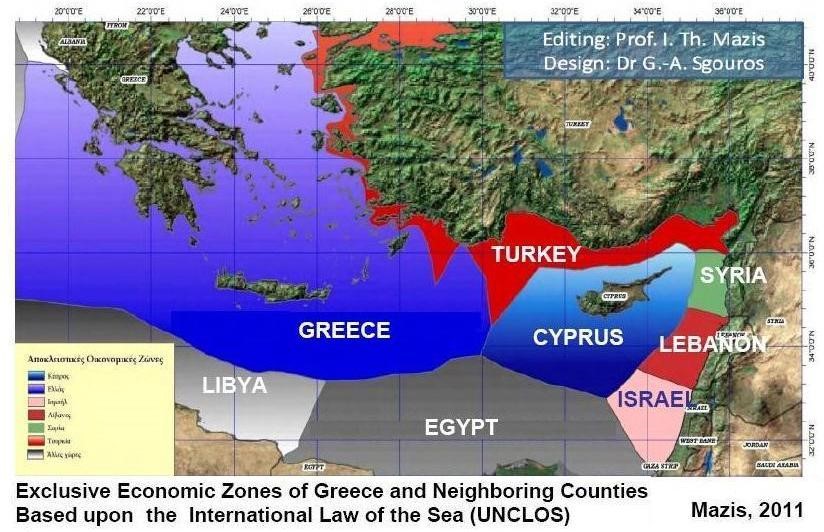Maritime disputes over the Exclusive Economic Zone of Cyprus
Julia Barnabas | 3 Mar 2018
Cyprus has been a divided island since 1983, between its Greek and Turkish Cypriot communities and it serves as one of the longest peacekeeping mission in United Nations history. The years 2003-2004 seemed to be the perfect moments to reunite Cyprus again so that it can enter the European Union as a federal state. However, nationalism, Cypriot leaders’ and the motherlands’ pursuit of self-interest, the property issues and other factors resulted in protracted social conflicts, and the problem is still unresolved.
One of the conflicts emerging from the existence of the “de facto” Turkish Republic of North Cyprus – which has not been recognized by none of the international actors but Turkey – are the Republic of Cyprus’ sovereign rights in the Exclusive Economic Zone and Turkey’s extent. On the one hand, according to United Nations Convention on the Law of the Sea (UNCLOS) and bilateral agreements with Israel, Lebanon and Egypt, the Republic of Cyprus have a disposal of 12 nautical miles as its EEZ. But on the other hand, Turkey does not take part in the UNCLOS as a result of the Aegean dispute with Greece and does not recognize the agreements between the Republic of Cyprus and Egypt – Lebanon – Israel. Consequently, Turkey has claims in Cyprus blocks 1, 4, 6 and 7 while also supporting the demands of the Turkish Republic of Northern Cyprus (TRNC) in blocks 1, 2, 3, 8, 9, 12, and 13.
Nicos Anastasiades the member of a conservative party, called Democratic Rally (DISY) has been re-elected as a Greek Cypriot president this February. He sees the reunification of the island as the biggest mission to achieve. However, right after the start of his new presidency he has to face a new challenge as Turkey has begun to extend a blockade that interrupts the operations of the Italian oil company ENI which conducts exploratory gas drills in block 3. Turkey is said to start oil and gas exploration in the Eastern Mediterranean, this March. As Turkish Cypriots argue that half of the islands’ EEZ constitute the part of their properties, they also claim their rights in the above-mentioned zones.
President Anastasiades view the demands of Turkey and TRNC as unacceptable and has turned to Greek Prime Minister Alexis Tsipras for support against Turkey’s intervention in the affected territory. Tsipras and Anastasiades will both have meeting with the Italian Prime Minister Gentilloni and the Greek Cypriot leader is about to reach the EU High Representative for Foreign Policy Federica Mogherini, as well. Italy seems to be willing to search for all the diplomatic attempts that help to resolve the problematic situation that affects not only Turkey, the TRNC and Cyprus, but also the interests of the whole economic area. The aim is to convince the EU to take a clear position about Ankara’s provocative actions. The EU has answered with threatening Erdogan to cancel a summit with Turkey next month, as according to EU President Donald Tusk: “These actions contradict Turkey’s commitment to good neighbourly relations.”
To conclude I would like to emphasis, how much this case represents the role of the motherlands in the Cyprus conflict which immediately becomes visible if we consider the threats of Ankara in the economic zone and its support for the Turkish Cypriot claims. The re-elected Greek Cypriot President has also immediately turned to the Greek Prime Minister for his backing against Turkey. In my opinion Turkey is not interested anymore in EU accession which makes the talks about the reunification even harder in this frozen conflict.










It was not the “Cypriot communities” that rejected the Annan Plan In 2004. It was the Greek Cypriots that overwhelmingly said “NO” to unification.
If this is not just a propaganda, you should talk about the facts.
What were the promises of EU to Turkish Republic of North Cyprus if they had accepted Annan’s plan?
By international Law, and EU law, Greek Cyprus alone could be admitted to full membership of EU despite of them saying NO to UN Resolution?
What are the basis of resolution for potential Conflicts in defining Exclusive Economic Zone between countries? Where else globally conflicts occurred due to spread islands between mainlands and how these are resolved between countries?
Check in google maps where is the Greek meis island and also check the length of coast line Turkey has and make a sane judgement!
Leave this crusader mind set and be civilized. Then you cannot be any different from those who open HagiaSophia as a mosque.
Lets remind who invade Cyrpus, who doesnt recognise it as state and who is invading its EOZ (recognised from every neighbor country except guess who…
Turkeys “international law” is claiming that no island can have EOZ!!!
The UNCLOS FROM 1982 is clear, EVERY island has its economic zone that is defined by the midle line, this is the reason Turkey didnt and will never sign it. But it fully compromise with it in the black sea when it sign EOZ with Russia, Bulgaria and all the rest states of the area.
According to your argument Greece should own all east Mediteranee with 13,676km coast line.